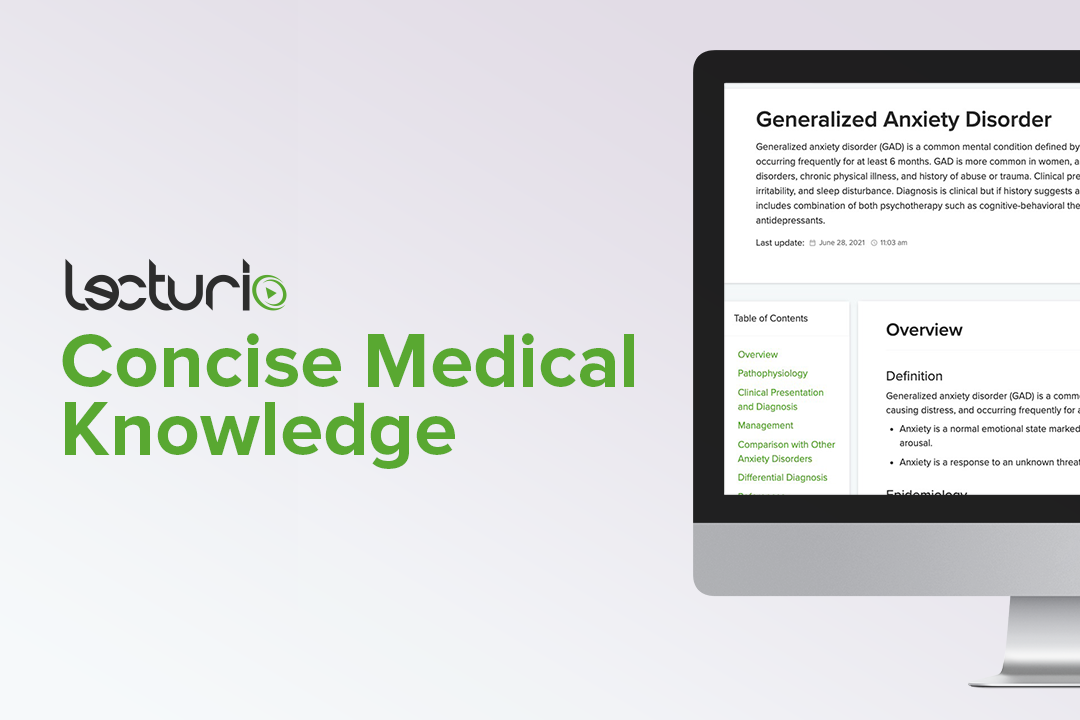Playlist
Show Playlist
Hide Playlist
Anxiety Disorders
-
Slides Anxiety AcuteCare.pdf
-
Download Lecture Overview
00:01 All right. 00:02 Now, don't be nervous, but we’re going to be talking about anxiety disorders now. 00:06 And let's start with a case to help illustrate this common condition that we see in primary care. 00:12 Now, remember back when I gave the introduction of family medicine, the way we approach the patient and I mentioned that you have to respond to patient's cues. 00:23 And they’re telling you something verbally or non-verbally, you want to make sure that you pay attention to it. 00:28 This is one of those cues. 00:29 So, if I come – walk in the room and I see a patient has taken off her clothes and is bent in this position, I know something is pretty wrong right away. 00:36 This has never happened before. 00:37 But let's see what her story is. 00:39 She looks in distress. 00:41 You’re seeing a 22-year-old woman, eight months history of anxiety symptoms which bother her on most days of the week and they have led to significant impairment. 00:48 So, sounds like a case of anxiety. 00:50 Let’s get a little bit more history. 00:52 She worked with a therapist already and she's tried relaxation therapy, but she now presents with – and she is desiring medical treatment. 01:00 She has never taken any chronic medications for anxiety in the past. 01:04 So, right away, let's think about what we want to do for treatment. 01:07 What will be the best choice for initial pharmacotherapy for this patient. 01:11 Is it, A, a benzodiazepine; B, tricyclic antidepressant; C, an SSRI; or D, bupropion? The answer to me is C. 01:21 SSRIs have a strong track record of efficacy in patients with generalized anxiety disorder and they are generally better tolerated than some of the other agents listed there and don't have the risk for misuse and addiction that benzodiazepines have. 01:38 So, we’ll go over therapy, but that's after we get through our usual discussion of epidemiology, symptomatology and diagnosis first. 01:47 So, anxiety is very, very prevalent. 01:50 So, the lifetime prevalence of an anxiety disorder, you can see it's well higher among women versus men. 01:56 Women have up to a 7, 7.5% risk whereas men have an average risk of 4% overall for generalized anxiety and panic disorder. 02:07 So, what are the risk factors for anxiety disorders? As I just mentioned, female sex is one. 02:13 It is hereditary. 02:13 Family history is important. 02:16 Comorbid mental health disorders. 02:17 And so, this could be – the most common one being depression, but also bipolar disorder, post-traumatic stress disorder can also be associated with significant anxiety and anxiety disorders. 02:30 And then, other physical diagnoses. 02:32 Pain is one that's frequently related to anxiety disorders. 02:36 Gastrointestinal disorders, particularly irritable bowel syndrome is one I think is commonly reflected in anxiety disorders as well. 02:46 And then a history of abuse. 02:47 So, that could be physical abuse or sexual abuse associated with a higher risk of anxiety as well. 02:54 What about the diagnostic criteria for generalized anxiety disorder. 02:58 First of all, the symptoms should be present for at least six months. 03:01 This is a chronic disorder. 03:03 They include anxiety and then they have to have at least three of the following symptoms – restlessness, fatigability, difficulty concentrating, irritability, muscle tension or sleep disturbance. 03:16 So, anxiety present for at least six months with three of those other symptoms, which shows when you’re talking about fatigability, difficulty concentrating, sleep disturbance, all those are related to function too and they really can have a significant impact on one's life. 03:32 Panic disorder, I actually think the criteria here are a little bit more lenient. 03:37 So, the definition of panic is a severe anxiety that peaks within minutes. 03:42 So, it really feels – we call them panic attacks because it feels like an attack. 03:47 It comes on. 03:48 Sometimes it's cued by certain things, maybe being in an enclosed space or some other memory that's triggered that produces panic. 03:56 A lot of times, it arises out of nowhere. 03:59 And then it goes away spontaneously within minutes as well. 04:05 Now, it has to be associated with at least four other symptoms. 04:08 And I’m just going to highlight a few of them because these describe some of the symptoms that are common in panic disorder. 04:13 Palpitations being one. 04:14 Feeling lightheaded. 04:16 Getting chest pain. 04:18 Feeling nauseous. 04:19 Sweating. 04:20 Getting tremulous, shaky. 04:22 But there are seven more. 04:23 That shows you how panic disorder can be very serious and promotes this grand total of symptoms. 04:31 So, many patients will have all of these symptoms in single episodes of panic. 04:36 And so, it's the panic episode itself and then worrying about the panic and what’s called agoraphobia, avoiding situations which cause the panic. 04:47 It’s literally – agoraphobia means fear of the marketplace. 04:51 That's what takes such a toll in panic disorder. 04:55 So, one thing with anxiety disorders, pay very close attention to psychosocial stressors. 05:00 How is the job going? Relationships, romantic and also within family or close friends, those you care about. 05:10 How is the financial situation? What else could be promoting anxiety? A lot of times, there is a trigger. 05:17 And that can be a good target for talk therapy or at least talking it out with you as their physician. 05:23 Even that's helpful. 05:24 The other thing as a clinical pearl I would offer is that many times these patients are younger, healthier adults and don't have the chronic disease that I see among my older patients. 05:37 These labs, hemoglobin, thyroid stimulating hormone, basic metabolic panel, they are a good idea to do in patients with anxiety disorders, but I wouldn't repeat them on a routine basis just because the symptoms are continuing. 05:50 Get them one time. 05:51 And if everything remains essentially stable, you shouldn’t get them for years afterwards because it's rare that I see evolving hyperthyroidism in somebody with generalized anxiety disorder. 06:01 Usually, it’s just the continuing anxiety disorder that gives them symptoms. 06:06 So, in terms of treatment for anxiety disorders, start with non-pharmacologic therapy first. 06:13 That includes limiting caffeine. 06:15 That's fairly obvious. 06:16 There's no treatment that's quite as good for generalized anxiety as exercise. 06:21 It really does work to reduce anxiety levels. 06:25 And it also has the side benefits of better sleep. 06:28 I think it's really empowering because patients can use it to help control their own illness. 06:34 So, it's empowering that way. 06:36 It leads to more satisfaction. 06:37 And, of course, it helps create a healthy weight, more muscle mass, less risk of diabetes and hypertension. 06:44 All of those, good things. 06:47 When it comes to pharmacotherapy, first-line therapy really is a serotonin reuptake inhibitor. 06:53 There is evidence of fair efficacy and the drugs are generally safe and well tolerated. 06:58 Tricyclic antidepressants can also be used for panic disorder, but there's a problem with tolerability due to anticholinergic side effects. 07:06 Buspirone is another option, but it’s just less effective. 07:08 So, it’s a second line agent. 07:11 And benzodiazepines, I don't recommend them generally for most patients for long-term use because of the potential for misuse and abuse, but they can be helpful for short-term situations. 07:22 And where I use benzodiazepines is particularly for patients with severe psychosocial stressors. 07:27 So, they just lost a loved one or they just went through an eviction this week. 07:35 Benzodiazepines may take the edge off that anxiety for another five or seven days, but usually that's the limitation I had put on it, is a week of treatment or so. 07:46 In terms of the clinical course, patients can feel heartened that, while it usually comes on while they’re in early adulthood, there are a number that remit spontaneously. 07:58 Whereas most developed, more chronic disease, 40% recover fully within 12 years. 08:04 Even among those who recover, though, there is a risk for dysthymic disorders and depression. 08:10 That may be as high as 50%. 08:12 So, that’s something to watch even among patients who have experienced a regression of their anxiety. 08:20 And when you diagnose a patient with both depression and anxiety at the same time, that predicts a longer clinical course. 08:28 Unfortunately, also greater functional impairment. 08:32 So, what we learned today was that anxiety disorders are very, very common. 08:37 And not to go overboard with your laboratory diagnosis. 08:42 Definitely pay attention to psychosocial stressors. 08:44 SSRIs in terms of pharmacotherapy are a great option, but don't forget about the basics, limiting caffeine and increasing exercise very important. 08:53 And also, consider talk therapy. 08:55 That can really work well for some patients and is a nice adjunctive treatment for patients with anxiety disorders. 09:02 Thank you very much.
About the Lecture
The lecture Anxiety Disorders by Charles Vega, MD is from the course Acute Care. It contains the following chapters:
- Anxiety Disorders
- Diagnostic Criteria of GAD and Panic Disorder
- Management of Anxiety Disorders: Medications
Included Quiz Questions
What is the minimum duration of symptoms for a diagnosis of generalized anxiety disorder?
- Six months
- Three months
- Three weeks
- One month
- One year
Which of the following statements regarding general anxiety disorder is INACCURATE?
- It is twice as common in men as it is in women.
- It is associated with increased rates of substance abuse.
- Major depression may occur as a comorbidity.
- There appears to be a genetic predisposition.
Which of the following statements regarding patients diagnosed with generalized anxiety disorder is most ACCURATE?
- Serotonin reuptake inhibitors are the first-line pharmacotherapy.
- Patients with comorbidities such as major depressive disorder have a better prognosis.
- Mean age of onset is mid-30s.
- The vast majority of patients suffer from major depressive disorder.
- People with anxiety are typically young and otherwise healthy with no other physical symptoms.
Which of the following set of symptoms is included in the diagnostic criteria of general anxiety disorder?
- Restlessness, easily fatigued, difficulty concentrating
- Weight loss, easily fatigued, difficulty concentrating
- Weight gain, reduced appetite, restlessness
- Reduced appetite, weight gain, easily fatigued
- Increased appetite, weight gain, difficulty concentrating
Which of the following is a first-line pharmacotherapy for long-term management of the panic disorder?
- Selective serotonin reuptake inhibitors
- Opiates
- Barbiturates
- Nonsteroidal anti-inflammatory drugs
- Tetrahydrocannabinol
Customer reviews
5,0 of 5 stars
| 5 Stars |
|
5 |
| 4 Stars |
|
0 |
| 3 Stars |
|
0 |
| 2 Stars |
|
0 |
| 1 Star |
|
0 |
is a good lecture. the lecturer is more practical english is very clear
4 customer reviews without text
4 user review without text




